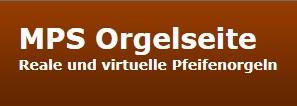Using the program ODF-Builder, i was able to make an ODF for the Esmuc sample set, made available by Pere Casacota on his website, that mimics the HW1 version.
More specifically, the Positiv has split keyboard at C/C# and only the Oboe is under expression.
To obtain this result, a few tricks had to be used.
Because the ODF-Builder program currently does not seem to have a native split keyboard function, i used 2 keyboards, one visible and the other hidden, and made for the 4 stops on the Positiv separate Left- and Right- Stops.
To do that, in the Left Stops all samples above note 060-C are replaced by silence, and conversely for the Right Stops all notes from 060-C and below are replaced by silence. This seems nessecary because the ODF-Builder program seems not fit to put 2 "half-keyboards" graphically alongside each-other so that it appears to be a single keyboard. Therefore for Left and Right stops a keyboard of 56 keys must be used and thus GO wants 56 consecutive notes for each stop.
A separate division is made for the Oboe to be able to have this as the only stop under expression. Here also a Left and Right Stop is used and the corresponding keyboards are hidden.
The trick is to assign the same midi channel to the Positiv keyboard and the ones for the Oboe.
Because you cannot right-click on a hidden keyboard configuration is done using in GO Audio/Midi and then Midi Objects to set the required midi channel.
Provided Pere makes the "split-keyboard" samples available, the ODF can be downloaded from this attachment.
Enjoy and all the best.
Erik.

